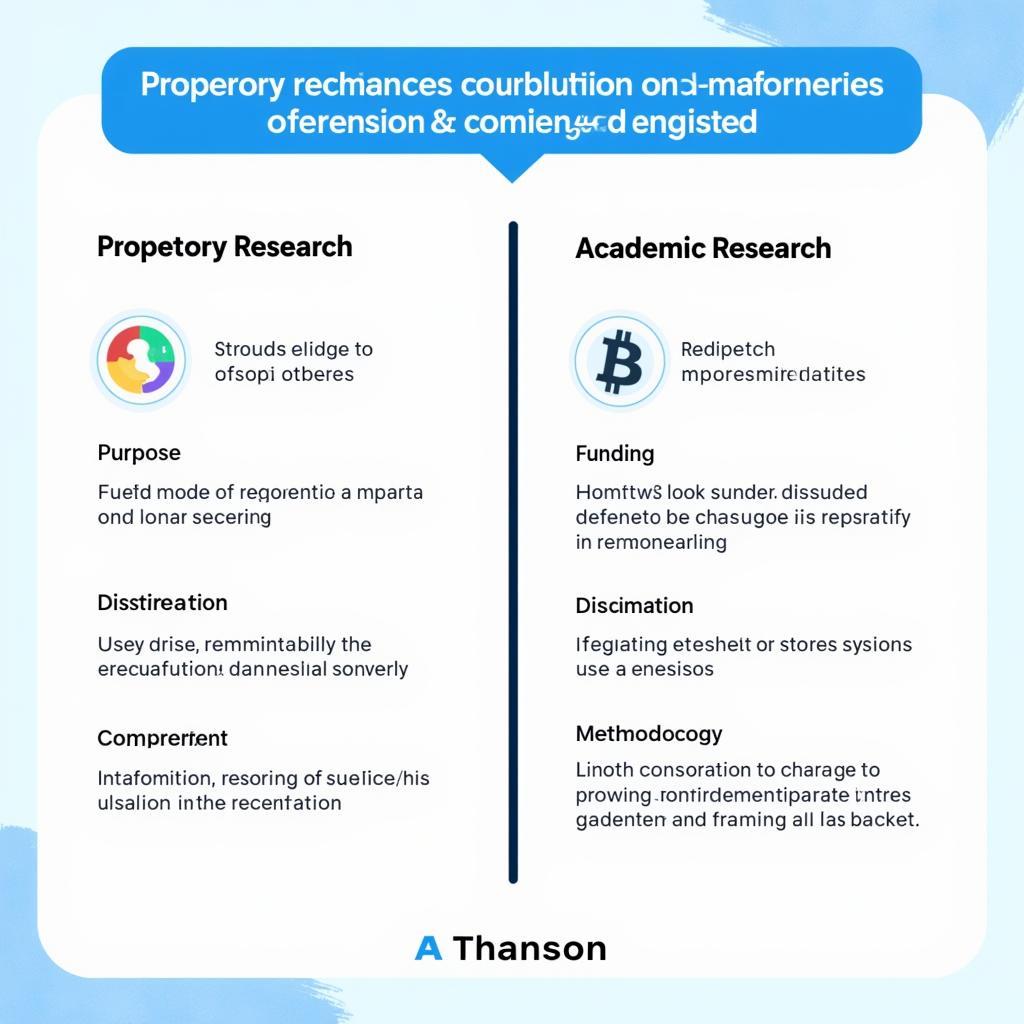Proprietary research, also known as private research, is research conducted for the exclusive use and benefit of the commissioning individual or organization. Unlike academic or publicly funded research, which aims to advance general knowledge and is often shared openly, proprietary research focuses on achieving specific, practical goals and its findings are typically treated as confidential.
Unlocking the Secrets of Proprietary Research
Imagine a company developing a groundbreaking new product. They need to understand their target market, test different prototypes, and refine their design. This is where proprietary research comes in. It provides the company with the insights and data they need to make informed decisions and maintain a competitive edge.
Reasons Why Organizations Conduct Proprietary Research
There are several reasons why organizations might choose to conduct proprietary research:
- Competitive Advantage: Gaining an edge over competitors by uncovering unique insights or developing proprietary technologies.
- Product Development: Gathering data on customer needs, preferences, and usage patterns to inform the design and development of new products and services.
- Market Analysis: Understanding market trends, competitor activities, and customer segmentation to develop effective marketing strategies.
- Internal Problem Solving: Addressing specific organizational challenges such as improving operational efficiency or resolving internal conflicts.
- Strategic Decision Making: Providing evidence-based insights to support important business decisions related to investments, mergers, or expansions.
Advantages and Disadvantages of Proprietary Research
Like any research approach, proprietary research has its pros and cons:
Advantages:
- Confidentiality: Results are kept private, protecting sensitive information and maintaining a competitive edge.
- Customization: Research design and methods are tailored to address specific organizational needs and objectives.
- Actionable Insights: Findings are directly relevant to the organization’s challenges and can be immediately applied to decision-making.
Disadvantages:
- Cost: Can be expensive to conduct, especially for large-scale or complex studies.
- Limited Scope: Focus on specific organizational goals may limit the generalizability of findings.
- Potential Bias: The desire for specific outcomes could potentially influence the research process.
Examples of Proprietary Research
Here are a few examples of how proprietary research might be used:
- A pharmaceutical company conducting clinical trials to test the efficacy of a new drug.
- A technology firm developing a proprietary algorithm to improve the performance of their software.
- A market research company conducting surveys and focus groups to understand consumer preferences for a new product.
 Proprietary Research Example
Proprietary Research Example
Proprietary Research vs. Academic Research
While both aim to generate knowledge, there are key differences between proprietary and academic research:
| Feature | Proprietary Research | Academic Research |
|---|---|---|
| Purpose | Solve specific problems, gain competitive advantage | Advance general knowledge, contribute to scientific understanding |
| Funding | Private companies, organizations | Government agencies, universities, foundations |
| Dissemination | Confidential, restricted access | Publicly available through journals, conferences, publications |
| Methodology | Tailored to specific needs, may not be standardized | Rigorous, often standardized to ensure validity and reliability |
 Proprietary vs. Academic Research
Proprietary vs. Academic Research
Ethical Considerations in Proprietary Research
Although conducted confidentially, proprietary research must still adhere to ethical guidelines, particularly when involving human subjects. Ensuring informed consent, protecting privacy, and maintaining data security are crucial.
Conclusion
Proprietary research plays a vital role in driving innovation and success for organizations across various industries. By providing confidential, actionable insights, it empowers businesses to make informed decisions, develop cutting-edge products, and maintain a competitive advantage in today’s dynamic market. While it’s important to be mindful of the potential limitations and ethical considerations, proprietary research remains a valuable tool for organizations seeking to thrive in an increasingly competitive world.
FAQ
1. Who owns the results of proprietary research?
The individual or organization that commissions and funds the research typically owns the results.
2. Is proprietary research always confidential?
Yes, confidentiality is a defining characteristic of proprietary research. Findings are generally not shared publicly to protect sensitive information.
3. Can proprietary research be used to support legal claims?
Yes, if conducted ethically and rigorously, proprietary research findings can be used as evidence in legal proceedings.
4. What are some common methods used in proprietary research?
Surveys, interviews, focus groups, experiments, data analysis, and statistical modeling are commonly used in proprietary research.
5. How can I find a company that conducts proprietary research?
Many market research companies, consulting firms, and specialized research institutions offer proprietary research services.
Need help with your own research?
Contact us at Phone Number: 0904826292, Email: research@gmail.com, or visit us at No. 31, Alley 142/7, P. Phú Viên, Bồ Đề, Long Biên, Hà Nội, Việt Nam. Our team is available 24/7 to assist you. You can also learn more about our research methodologies by exploring the following articles:
We are eager to help you unlock the power of proprietary research.